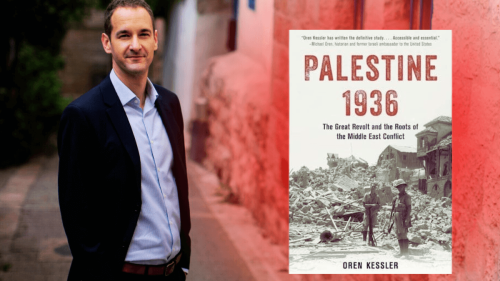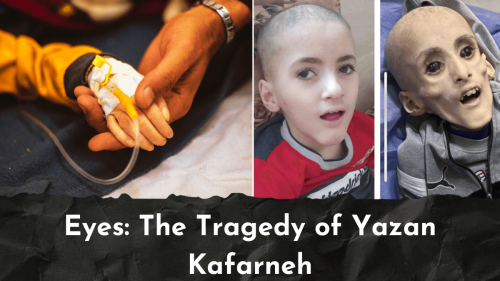Edward Said Warned Against Anti-Palestinian McCarthyism

Said’s legacy reads today as a scathing condemnation of the hypocrisy of U.S. liberal institutions, their moral corruption, and the hollowness of the very values that they profess to teach.
Students across the United States are rising up against Israel’s genocide in Gaza, bringing to memory the student movements of the 1960s. From Columbia to Brown, from Yale to Harvard, students are staging sit-ins, hunger strikes, class walkouts, and interfaith prayers, demanding an end to U.S. support for Israel and the complicity of their academic institutions in the ongoing genocide.
While some U.S. institutions are treading a delicate path, the Columbia University administration, led by President Minouche Shafik, has violently cracked down on its own students, summoning the NYPD to mass arrest over 100 students, and suspending others with a 15-minute notice. In an unprecedented brutal crackdown on free speech on campus, the police destroyed solidarity encampments and student belongings, while charging arrested students with “trespassing” on the campus that they are charged a whopping tuition of more than $60,000 a year to attend!
In its attempt to appease far-right extremists in Congress, and to save Columbia from “being cursed by God,” as a Republican Congressman warned Shafik, Columbia has sided with genocide, thus undermining its own legacy of safeguarding free speech and peaceful protest on campus.
Perceptively, Said warned of weaponizing antisemitism and the plight of Jews in Europe as a means to suppress and vilify Palestinians, and to justify Israel’s oppression of its victims.
The violence has backfired, as hundreds of students continue to protest at Columbia, sparking a ripple effect across U.S. campuses, and defying what they see as a growing McCarthyism in U.S. academia. An early target of this academic McCarthyism was the prominent Palestinian-American intellectual and distinguished Columbia Professor Edward Said, whose writings on postcolonialism, humanism, and democratic criticism are required readings at Columbia and across the humanities.
Said was a victim of anti-Palestinian intimidation himself. His office at Columbia was occasionally raided and vandalized. He received several death threats and was smeared with terrorism accusations and spied on by students and AIPAC agents. Shortly before his death, Said became the target of a vicious academic persecution, which he survived only because Columbia still had a shred of academic and moral integrity at the time.
In July 2000, Said went to South Lebanon on a solidarity tour, where he hurled a rock toward an Israeli guardhouse from the Lebanese border, which he described as “a symbolic gesture of joy” to mark the end of Israeli occupation of southern Lebanon. A photographer caught the action, featuring Said with his arm reached far behind him, ready to throw. The Israeli lobby, led by Anti-Defamation League, called on Columbia to punish Said. Columbia refused to be intimidated, though it took the administration two months of eerie silence to respond. In its five-page letter response, the university said that Said’s action was protected under the principles of academic freedom. Citing John Stuart Mill as well as from the Columbia Faculty Handbook, the letter asserted:
There is nothing more fundamental to a university than the protection of the free discourse of individuals who should feel free to express their views without fear of the chilling effect of a politically dominant ideology... This matter cuts to the heart of what are fundamental values at a great university.
In defense of Said, the letter added: “If we are to deny Professor Said the protection to write and speak freely, whose speech will next be suppressed and who will be the inquisitor who determines who should have a right to speak his or her mind without fear of retribution?”
The era of moral clarity and intellectual integrity in academia is now unraveling amid Israel’s genocide in Gaza. The tragic irony is that the current atmosphere of anti-Palestinian McCarthyism on U.S. campuses—led by an unlikely coalition of far-right Republicans, mainstream media, and liberal academic institutions—was foreseen by none other than Said himself. In his seminal essay, “Zionism from the Standpoint of Its Victims” (1979), Said warned:
The special, one might even call it the privileged, place in this discussion of the United States is impressive, for all sorts of reasons. In no other country, except Israel, is Zionism enshrined as an unquestioned good, and in no other country is there so strong a conjuncture of powerful institutions and interests—the press, the liberal intelligentsia, the military-industrial complex, the academic community, labor unions—for whom […] uncritical support of Israel and Zionism enhances their domestic as well as international standing.”
Presaging the rise of anti-Palestinian McCarthyism in academia, Said detected a state of academic repression and campus policing in which Palestinians “have no permission to narrative” and are increasingly demonized and silenced in the name of fighting antisemitism—a loaded concept that has become a shield for Israel’s genocide and ethnic cleansing of Palestinians. Perceptively, Said warned of weaponizing antisemitism and the plight of Jews in Europe as a means to suppress and vilify Palestinians, and to justify Israel’s oppression of its victims. He understood that systematically inflating antisemitism with the critique of Zionism was feeding anti-Palestinian sentiments in U.S. academic and media discourse. He further warned:
One must admit, however, that all liberals and even most “radicals” have been unable to overcome the Zionist habit of equating anti-Zionism with antisemitism. Any wellmeaning person can thus oppose South African or American racism and at the same time tacitly support Zionist racial discrimination against non-Jews in Palestine. The almost total absence of any handily available historical knowledge from non-Zionist sources, the dissemination by the media of malicious simplifications (e.g., Jews vs. Arabs), the cynical opportunism of various Zionist pressure groups, the tendency endemic to university intellectuals uncritically to repeat cant phrases and political clichés (this is the role Gramsci assigned to traditional intellectuals, that of being “experts in legitimation”), the fear of treading upon the highly sensitive terrain of what Jews did to their victims, in an age of genocidal extermination of Jews—all this contributes to the dulling, regulated enforcement of almost unanimous support for Israel.
The assault on Columbia students is an attack on constitutional rights and the basic tenets of democracy. It’s deplorable that the one of the most violent crackdown on student protests in U.S. history is coinciding with one of the worst genocides in recent memory, which has killed over 35,000 Palestinians in Gaza, most of them children, and displaced nearly two million others.
One day after the mass arrests at Columbia, Palestinians in Gaza unearthed large mass graves at Nasser Hospital in Khan Younis, containing hundreds of civilians and patients who were massacred or buried alive by Israel. More deplorable, from the young generation’s standpoint, is that this genocide is being backed and sustained by U.S. weapons and tax money, diplomatic support, and media and academic complicity. (The Biden administration is preparing to send its largest military aid package to Israel in U.S. history, with bipartisan blessing.) Despite massive protests, U.S. colleges have refused to divest from Israel over its genocidal war in Gaza (with few notable exceptions that include Rutgers and UC Davis.) Several universities, including Columbia, have suspended the chapters of Students for Justice in Palestine and Jewish Voice for Peace.
Edward Said’s legacy reads today as a scathing condemnation of the hypocrisy of U.S. liberal institutions, their moral corruption, and the hollowness of the very values that they profess to teach. This irony is best illustrated by a Columbia student’s protest sign, which read:
“Columbia, why require me to read Prof. Edward Said, if you don’t want me to use it?”
Seraj Assi is a Palestinian writer living in Washington D.C.
(Source: Republished under the Creative Commons License (CC BY-NC-ND 3.0) from Common Dreams ).
Topics: Gaza Encampments, Israeli-Palestinian Conflict, Jews, Palestine, Zionism
Related Suggestions

















